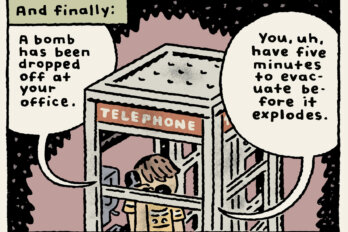Over the holiday break, I was asked to host the @indigenousXca Twitter account, an account shared by different Indigenous activists, academics, and artists each week. I used that hosting opportunity to raise the question of author Joseph Boyden’s Indigenous identity—his “Indigeneity.” Raising this question inadvertently brought an Indigenous debate about identity and belonging into the non-Native media mainstream.
The Walrus magazine and its editor, Jonathan Kay, were among the first non-Native media to take notice of the Boyden issue a few days after it arose on social media and in an APTN news report. Kay wrote an article that was sub-headlined: “Attacking a man’s racial composition is never an entirely benign exercise.”
In that article, and in a subsequent appearance on CBC’s The National this Sunday, Kay focused on the issue of race, saying “I am troubled [by] the interrogation of someone on the basis of their racial ancestry.” He characterized the APTN investigation into Boyden’s ancestry as being “precisely about his genetic makeup,” and suggested that it would lead to a “DNA test mentality” in determining who could speak for Indigenous communities. On each of these three points, Kay is incorrect and shows a misunderstanding of the context of this Indigenous debate.
Kay is not alone in making this error. It has shown up in other non-Native writing on the subject. The Waterloo Record, for instance, described the controversy as an extension of the US Birther movement, which is based on the conspiracy theory that Barack Obama was not born in the United States:
It did not take very long for the ugly “Birther” movement to migrate north from the United States . . . Despite the accusations, there is no proof [Boyden] fabricated anything. He has always maintained his ancestry to be Scottish, Irish and Métis. The latter term has several meanings, but always includes Canadians with mixed ancestry of Indigenous and settler peoples.
When I posted my first set of Tweets on Joseph Boyden in late December, I began with a discussion of identity, in which I used non-Native Postmedia writer Terry Glavin as an example of inclusion.
When I was a teenager living on the Katzie First Nation reserve, in BC’s Lower Fraser Valley, Glavin was a constant presence. He could be seen working at the band office, dropping by my mom’s restaurant for a burger, or fighting to help the community assert its inherent fishing rights. When my cousin, a native fisheries officer, was killed in an accident on the river, Glavin wrote the report for the inquest into his death. Most relevant to this debate, he wrote the definitive book on St Mary’s Residential School—the school attended by my grandmother and several of my aunts.
Glavin is white. But undoubtedly, he has earned a place in our community—a fact that a prominent Boyden supporter, Chief Ernie Crey, a good friend of Glavin’s, would not dispute. Kay quotes Ernie Crey in his Walrus article saying that if “the dust-up over the heritage of Joseph Boyden continues, we’ll all end up in a DNA lab.”
Glavin is one of a dozen non-Natives I’ve known over the years who have committed themselves to the “rez,” and who earned a place as part of our community sans any Indigenous DNA.
I introduced this point to demonstrate that there is a path to belonging, or as Wab Kinew said in his January 3 Globe and Mail article: “There is room in our circle for Joseph Boyden.” But in our culture, as in every culture, it’s something that has to be earned.
The controversy as it stands within the Indigenous community relates to the fact that, as I see it, Boyden feels he doesn’t need to earn a place in that circle, that he is owed that space because he inherited it due to what he calls his “Aboriginal Blood.”
It is important to note that it is Boyden himself and his supporters who refer to blood. “I have one-eighth aboriginal blood, the same amount as Louis Riel,” he once declared. In the non-Native media, the issue has been debated entirely on Boyden’s terms—of blood, DNA, and ancestry.
That number, one-eighth is important in how little it matters, and how little it is discussed by Indigenous people. It doesn’t matter if he’s ½, 1/8th or 1/64th. Indigenous people don’t care about that. It is a non-Native fixation alone. For us, the issue is right there in the APTN article’s title: “Boyden’s shifting identity.”
Over the years, Joseph Boyden has described himself as a member of different indigenous communities from those he now claims to be part of. In an interview with a New Orleans paper, he referred to himself as “Mi’kmaq . . . an east coast tribe in Canada.” In others, he calls himself Métis. According to Muskrat Magazine editor Rebeka Tabobondung, he told her he was from the Wasauksing First Nation (something Tabobondung could not verify).
In a message to Métis activist, Chelsea Vowel, he described himself as being from the “Cape Crocker side of Georgian Bay.”
According to Ian Campeau, member of the band A Tribe Called Red, which collaborated with Boyden in the making of their new album, Boyden said he claimed Indigenous status through his uncle “Injun Joe,” a man who publicly and repeatedly denied any Indigenous heritage and laughed at the idea that people believed he was an “Indian.”
It seems that almost every day another First Nations collaborator of Boyden’s comes forward to tell of a different claim from Boyden.
Boyden has established himself as a political figure in First Nations communities, and has become more and more involved in the issue of Reconciliation. To Indigenous people, Boyden is not just a novelist; he is a politician. And no other Canadians would be asked to remain silent and take the word of a politician who had so many different stories on something so basic to their identity.
This is not a matter of blood, but a matter of belonging. I use those two words, Blood and Belonging, pointedly, because that was a title of a 1993 book by Michael Ignatieff, a man who you may notice is not currently the Prime Minister of Canada. As Liberal leader, Ignatieff failed in his pursuit of the office, in part because of a successful Tory campaign that showed him telling one group of people that he identified as an American, and another he identified as a Canadian. Ignatieff had no credible reply to these issues of identity, and his obfuscation resulted in his party taking a historic beating. Non-Native Canadians have little tolerance for politicians with “shifting identities.”
When it’s not about Indigenous people, Canadians understand that to be “one of us,” you have to commit to us and be accepted by us.
The topic of Identity has appeared before in The Walrus, in a 2009 article on Jewish identity by Katie Addleman titled “Birthright.” As she wrote, “the question of what constitutes Judaism will never be answered if there are no Jews left to ask it.”
Addleman was writing about the inclusive nature of “Birthright Israel,” an organization founded by Canadian philanthropist Charles Bronfman—a good deed for which The Walrus praised him again in the October, 2016 article When the Rich Were Kind.
Birthright Israel organizes all-expense paid trips to Israel, to help connect Jewish youth with their communities. The inclusivity to which Addleman refers is Birthright’s inclusion of non-religious “cultural” Jews. Here is the “inclusive” criteria that the group uses to determine who can join one of their trips: “Eligible individuals are those who identify as Jewish and are recognized as such by their local community or by one of the recognized denominations of Judaism.”
Throughout the Joseph Boyden controversy, a version of that formulation has been heard again and again from Boyden’s Indigenous critics on Twitter, including Chris Andersen, Beadworker, Jyl Shaffer, Robin Mazumder, Hayden King, Starleigh Grass, and shadyhfz. To borrow from Birthright, a Native is a person who identifies as Native and is recognized as such by an Indigenous community. At its most basic, this is the definition of Indigeneity that few Indigenous people would dispute.
Of course, there are those who would dispute what I’ve described above, including the question of what constitutes acceptance by a community. There are more than 200 different independent First Nations membership codes in Canada; and thus, such political questions being what they are, 400 different opinions on the subject.
But by the broadly accepted definition I’ve put forward, it appears that Joseph Boyden is not Indigenous. While he may self-identify as one of us, he has yet to point to a community that recognizes him as such, though he has tried to point to many different communities.
The issue of Indigenous identity, which The Walrus and other Non-Native media now have inserted themselves into, has become hotly debated by Indigenous people in the wake of tribal disenrollments in the US—as well as side effects of Canada’s 2013 Family Homes on Reserves and Matrimonial Interests or Rights Act.
The 2013 Act, passed against the objections of First Nations, forced every First Nation to examine membership rules, including how they relate to Non-Natives inheriting the rights and property of their First Nations partners.
The outcome of these debates has been varied, and ranges from the widely criticized blood quantum rules of Kahnawake, to a laissez-faire contract-based system of inheritance—one that is open to inheritance by non natives—that my mother is helping to introduce on the Kwantlen First Nation.
Online, in Indigenous publications, and in band councils across this country, we’ve spent the last three years talking about identity, even if the non-Native media has been slow to notice. The Joseph Boyden controversy fits into that context.
Something that appears to be hard for Non-Native people to accept is that they don’t get to define our communities for us anymore. This is our debate, and it’s one taking place, in separate forms, in more than 600 different communities across Canada.
The outcome of that debate may define what it means to be Haida or Wendat. But what it won’t do is define what it is to be “Native.” And that’s because there is no such thing as a “Native.” The blood-based native identity that Joseph Boyden asserts is not a valid Indigenous identity.
The concept of Native as its own identity (and not as a placeholder word for a specific tribal or nation identity), is a product of colonialism and the Indian Act. In the words of anti-colonial writer Frantz Fanon, “it is the settler who has brought the native into existence and who perpetuates his existence.”
There are Salish people, Haida, Cree, Ojibway, Métis, and Mi’kmaq among many others, all three dimensional individuals you can walk up to on the street, and not one of which identifies with some culture called “Native.” Still, we are told that a thing called the Native race exists, that Boyden is a member of it, that his disconnect from any community doesn’t matter, and lastly that we have no say in this.
Boyden has claimed many communities. The APTN article sought to investigate those claims, looking at his connection to each nation. They weren’t looking for people of a particular race, but to see if any ancestor had any connection with those bands. They found none. Many non-Native commenters tell us to ignore that, to ignore Boyden’s shifting stories because they like his books. Such voices publish on Twitter under the names John Corbett, JLuc, Mike Utsal, John Wilbur and Gerhard Gehrmann.
For non-Natives to call this investigation a “lynching” or a racial witch hunt is the epitome of colonial arrogance. When Canadians were presented with Michael Ignatieff and his shifting loyalties, legitimate questions were asked. But when we Indigenous people present pointed questions to what is in effect, a shady politician, we’re treated to grade-school lectures about bad form.
We’re told to accept someone as one of us who doesn’t meet our standards of belonging, because he meets a non-Native standard for a type of race-based identity that we don’t recognize. On top of that we see the media attacking us for imposing a standard of community-centred belonging that goes unquestioned when practiced by others (including, in the example provided above, Jewish Canadians).
This double standard, and this dismissal of Indigenous concerns, is the most troubling aspect of the Boyden issue.
Correction: an earlier version of this article misspelled the surname of Ian Campeau, a member of producer and DJ crew A Tribe Called Red.





